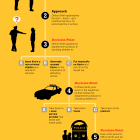
Why Youth Prisons Are Like Leeches
|
Imagine you are feeling sick and your doctor hands you this hand-scrawled prescription: LEECH THERAPY. If you are like me, you may run out of the doctor’s office screaming.
Juvenile Justice Information Exchange (https://jjie.org/tag/youth/page/3/)

Imagine you are feeling sick and your doctor hands you this hand-scrawled prescription: LEECH THERAPY. If you are like me, you may run out of the doctor’s office screaming.

At a time when communities across the country are interested in evidence-based youth programming, an April conference will bring together leaders from the field to discuss what’s possible.

Hey, you! Yes, YOU can make it happen! Anyone can. Whether you are a principal, a student, counselor or teacher, you can be the one to speak up for restorative justice. “Be the change you wish to see in the world” (Mahatma Gandhi).

Is there ever a “good” youth arrest? Even without the use of excessive force, arrest can prove traumatic and destructive and the effects long lasting. One police leader from a small Pennsylvania town recounted the story of a young person who lost his promising future, with a merit-based scholarship to a four-year college, when police arrested him and charged him with a curfew violation.

Juan (name changed), convicted of aggravated assault at 21, has been in solitary for five years. He has seen and experienced it all: brutal cell extractions, hunger strikes, flooded pods and endless hours spent screaming at his cell door.

When did making adults mad become a crime?
I asked myself this question shortly after I started judging in juvenile court when confronted with a docket inundated with disruptive students referred from the schools. Most were misdemeanor incidents involving fights, disorderly conduct, disrupting school, graffiti and theft.

For as long as anyone can remember, children bought and sold for sex in the United States have been ignored or worse — they have been arrested, incarcerated and released right back onto the streets.

Individualized justice, economic equality and factual accuracy should supply the science driving reform, not century-old biodeterminism.

The art of leadership, some say, is not in finding followers, but in creating more leaders.
Something I wish I had thought about when I first developed the school-justice partnership.